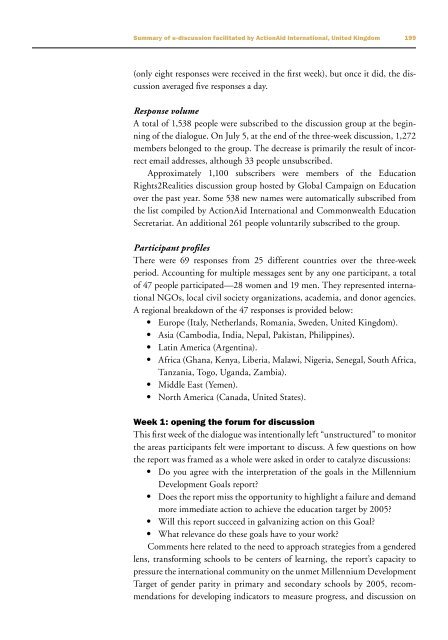Taking action: achieving gender equality and empowering women
Taking action: achieving gender equality and empowering women
Taking action: achieving gender equality and empowering women
You also want an ePaper? Increase the reach of your titles
YUMPU automatically turns print PDFs into web optimized ePapers that Google loves.
Summary of e-discussion facilitated by ActionAid International, United Kingdom<br />
199<br />
(only eight responses were received in the first week), but once it did, the discussion<br />
averaged five responses a day.<br />
Response volume<br />
A total of 1,538 people were subscribed to the discussion group at the beginning<br />
of the dialogue. On July 5, at the end of the three-week discussion, 1,272<br />
members belonged to the group. The decrease is primarily the result of incorrect<br />
email addresses, although 33 people unsubscribed.<br />
Approximately 1,100 subscribers were members of the Education<br />
Rights2Realities discussion group hosted by Global Campaign on Education<br />
over the past year. Some 538 new names were automatically subscribed from<br />
the list compiled by ActionAid International <strong>and</strong> Commonwealth Education<br />
Secretariat. An additional 261 people voluntarily subscribed to the group.<br />
Participant profiles<br />
There were 69 responses from 25 different countries over the three-week<br />
period. Accounting for multiple messages sent by any one participant, a total<br />
of 47 people participated—28 <strong>women</strong> <strong>and</strong> 19 men. They represented international<br />
NGOs, local civil society organizations, academia, <strong>and</strong> donor agencies.<br />
A regional breakdown of the 47 responses is provided below:<br />
• Europe (Italy, Netherl<strong>and</strong>s, Romania, Sweden, United Kingdom).<br />
• Asia (Cambodia, India, Nepal, Pakistan, Philippines).<br />
• Latin America (Argentina).<br />
• Africa (Ghana, Kenya, Liberia, Malawi, Nigeria, Senegal, South Africa,<br />
Tanzania, Togo, Ug<strong>and</strong>a, Zambia).<br />
• Middle East (Yemen).<br />
• North America (Canada, United States).<br />
Week 1: opening the forum for discussion<br />
This first week of the dialogue was intentionally left “unstructured” to monitor<br />
the areas participants felt were important to discuss. A few questions on how<br />
the report was framed as a whole were asked in order to catalyze discussions:<br />
• Do you agree with the interpretation of the goals in the Millennium<br />
Development Goals report?<br />
• Does the report miss the opportunity to highlight a failure <strong>and</strong> dem<strong>and</strong><br />
more immediate <strong>action</strong> to achieve the education target by 2005?<br />
• Will this report succeed in galvanizing <strong>action</strong> on this Goal?<br />
• What relevance do these goals have to your work?<br />
Comments here related to the need to approach strategies from a <strong>gender</strong>ed<br />
lens, transforming schools to be centers of learning, the report’s capacity to<br />
pressure the international community on the unmet Millennium Development<br />
Target of <strong>gender</strong> parity in primary <strong>and</strong> secondary schools by 2005, recommendations<br />
for developing indicators to measure progress, <strong>and</strong> discussion on

















